Release Notes: MetaTrader 4
MetaTrader 4 Forex Trading Platform
MetaTrader 4 update will be released on November 9, 2018 in beta mode. The update fixes errors and improves the platform stability.
All traders are invited to join the new version test. To receive the update, connect to the MetaQuotes-Demo server located at demo.metaquotes.net:443. The update will be installed via the LiveUpdate system.
The release build of the MetaTrader 4 platform will be issued after the test.
A month ago, Microsoft released a major update of their operating system Windows 10 Creators Update (version 1703). After installing this update, some users were unable to run MQL4 programs in their terminals. This issue has been fixed in the new MetaTrader 4 platform build 1080. Now, Expert Advisors and indicators will run on charts correctly, while recompilation using the updated MetaEditor is not required.
Support for MetaTrader 4 client terminal versions below 1065 will be discontinued on the 1st of October 2017. Unsupported terminal builds will not be able to connect to new server versions. We strongly recommend that you update your terminals in advance.
In the new version, an error has been fixed connected with the restart of Expert Advisors on charts after switching timeframes. Now, Expert Advisors do not stop, and are correctly re-initialized.
The release of MetaTrader 4 platform is connected with the release of Windows 10 Insider Preview build 15007. Due to security updates in the new Windows 10 system version, MetaTrader 4 client terminals could occasionally fail to start.
Install the new platform version in order to prepare for the upcoming Windows 10 update.
Added chat enabling traders to chat with other MQL5.community members. Specify the desired user's login in a message recipient's section to send a message directly to this user's mobile device.
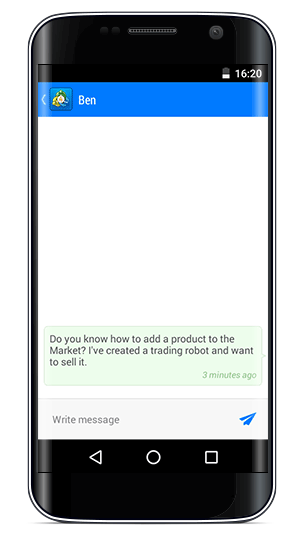
- Added ability to edit indicator levels.
- Added interface translations into Indonesian and Hindi.
- A new design of messages. Now, MQL5.community messages and push notifications from the desktop platform are displayed as chats similar to popular mobile messengers.
- Now it is possible to switch to one of the 22 available languages straight from the platform. Choose any UI language from the "Settings" section ("About" in iPad) without changing the language setting of your device.
Terminal
- Fixed an error which prevented execution of MQL4 applications in terminals running in 32-bit Windows 10, build 1607.
- Fixed occasional incorrect display of the Search and Chat buttons.
- Fixed occasional duplicate welcome-emails delivered to the terminal when opening a demo account.
MQL4
- Added new 'void *' pointers to enable users to create abstract
collections of objects. A pointer to an object of any class can be saved
to this type of variable. It is recommended to use the operator
dynamic_cast<class name *>(void * pointer) in order to cast back.
If conversion is not possible, the result is NULL.
class CFoo { }; class CBar { }; //+------------------------------------------------------------------+ //| Script program start function | //+------------------------------------------------------------------+ void OnStart() { void *vptr[2]; vptr[0]=new CFoo(); vptr[1]=new CBar(); //--- for(int i=0;i<ArraySize(vptr);i++) { if(dynamic_cast<CFoo *>(vptr[i])!=NULL) Print("CFoo * object at index ",i); if(dynamic_cast<CBar *>(vptr[i])!=NULL) Print("CBar * object at index ",i); } CFoo *fptr=vptr[1]; // Will return an error while casting pointers, vptr[1] is not an object of CFoo } //+------------------------------------------------------------------+
- Added support for the operator [ ] for strings. The operator enables
users to get a symbol from a string by index. If the specified index is
outside the string, the result is 0.
string text="Hello"; ushort symb=text[0]; // Will return the code of symbol 'H'
- The CopyXXX function that copies history and tick data has become faster.
- Fixed deletion of multiple graphical objects with the specified prefix
using the ObjectDeleteAll function. Before the update, the remaining
objects could be displayed in a wrong order after the execution of this
function.
- Fixed occasional incorrect order of graphical objects display after changing the timeframe.
Hosting
- During terminal synchronization with the virtual server, charts without Expert Advisors are ignored now, even if custom indicators are running on these charts. If you need to migrate a custom indicator, run it on the chart of an "empty" Expert Advisor that does not perform operations. Such an Expert Advisor can be easily generated using the MQL4 Wizard in MetaEditor by selecting "Expert Advisor: template". This update is to ensure that indicators are migrated on purpose.
- You can now synchronize Expert Advisors and custom indicators whose names contain non-Latin characters (e.g. Cyrillic or Chinese characters).
Fixed errors reported in crash logs.
Terminal
- New built-in chat. Now, traders can chat with their MQL5.community friends and fellow traders straight from the platform. The chat
maintains the history of messages, as well as it features the number of unread messages. To start a chat, log in to your MQL5 account straight from the chat window or via the platform settings: 'Tools' -> 'Options' -> 'Community'.
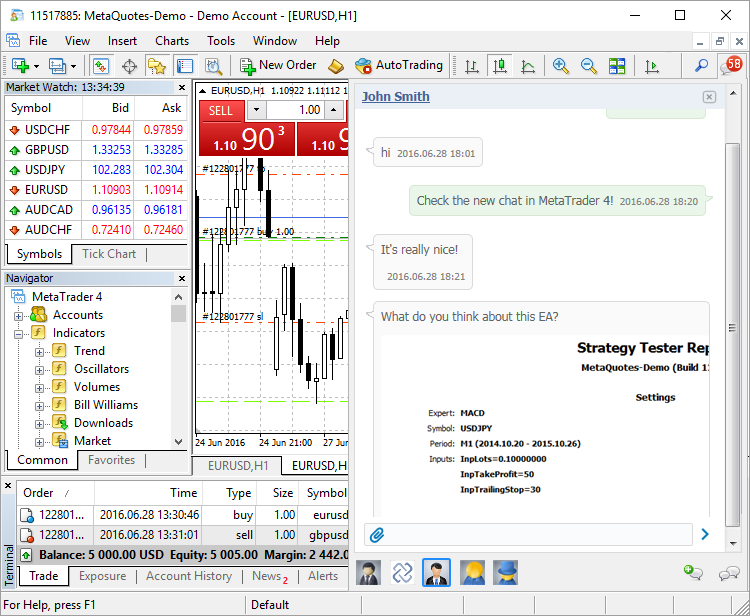
- Optimized reading of the internal mail database when the terminal starts.
MQL4
- Added an option to show/hide the price and time scale on any chart. In earlier versions, an MQL4 application could only change the CHART_SHOW_PRICE_SCALE and CHART_SHOW_DATE_SCALE properties of the chart, on which it was running.
- New MODE_CLOSEBY_ALLOWED property for the MarketInfo function. TRUE means that the Close By operation (closing by a counter position) is allowed for the specified financial symbol.
- Fixed passing of a string parameter to the OnChartEvent entry point. The error could cause a false value of the parameter. OnChartEvent allows tracking chart events: keypress events, mouse movement and more.
- Implemented faster deletion of multiple graphical objects using the ObjectsDeleteAll function.
Signals
- Improved automated matching of currency pairs containing RUB and RUR.
Tester
- Fixed stamping of graphical object creation time during testing. In earlier versions, the current terminal time was added instead of testing time.
MetaEditor
- Fixed setting of focus in the replace text field when opening a replace dialog box.
- Fixed replacing of multiple text occurrences when you search upwards starting from the current positions.
Terminal
- Simplified demo account creation dialog. You do not have to fill the large form any
more. Simply specify basic data and select trading parameters: account
type, deposit and leverage.
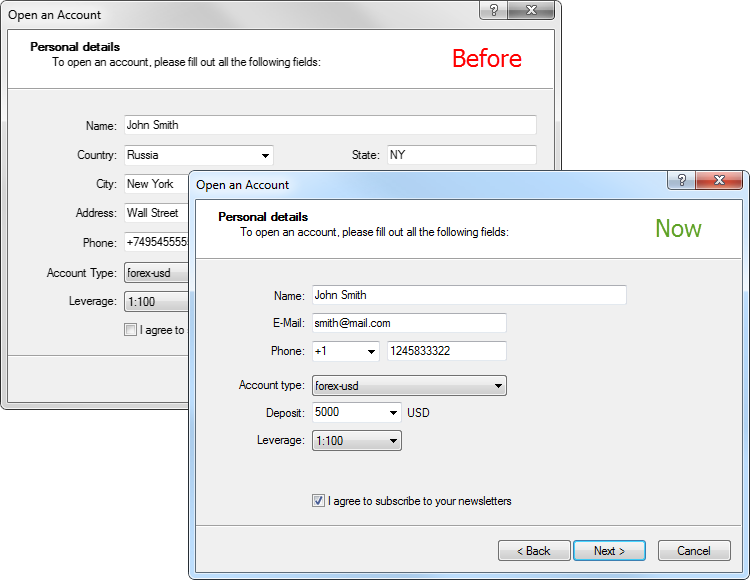
MQL4
- The format of the executable EX4 files has changed to
implement the new features of the MQL4 language. All EX4 applications
compiled in previous builds of MetaEditor will work properly after the
update. Thus, the upward compatibility is fully preserved.
EX4 programs compiled in build 970 and above will not run in old terminal builds - backward compatibility is not supported.
- Added support for abstract classes and pure virtual functions.
Abstract classes are used for creating generic entities, that you expect to use for creating more specific derived classes. An abstract class can only be used as the base class for some other class, that is why it is impossible to create an object of the abstract class type.
A class which contains at least one pure virtual function in it is abstract. Therefore, classes derived from the abstract class must implement all its pure virtual functions, otherwise they will also be abstract classes.
A virtual function is declared as "pure" by using the pure-specifier syntax. Consider the example of the CAnimal class, which is only created to provide common functions – the objects of the CAnimal type are too general for practical use. Thus, CAnimal is a good example for an abstract class:
class CAnimal { public: CAnimal(); // Constructor virtual void Sound() = 0; // A pure virtual function private: double m_legs_count; // How many feet the animal has };
Here Sound() is a pure virtual function, because it is declared with the specifier of the pure virtual function PURE (=0).
Pure virtual functions are only the virtual functions for which the PURE specifier is set: (=NULL) or (=0). Example of abstract class declaration and use:
class CAnimal { public: virtual void Sound()=NULL; // PURE method, should be overridden in the derived class, CAnimal is now abstract and cannot be created }; //--- Derived from an abstract class class CCat : public CAnimal { public: virtual void Sound() { Print("Myau"); } // PURE is overridden, CCat is not abstract and can be created }; //--- examples of wrong use new CAnimal; // Error of 'CAnimal' - the compiler returns the "cannot instantiate abstract class" error CAnimal some_animal; // Error of 'CAnimal' - the compiler returns the "cannot instantiate abstract class" error //--- examples of correct use new CCat; // no error - the CCat class is not abstract CCat cat; // no error - the CCat class is not abstract
Restrictions on abstract classes
If the constructor for an abstract class calls a pure virtual function (either directly or indirectly), the result is undefined.
//+------------------------------------------------------------------+ //| An abstract base class | //+------------------------------------------------------------------+ class CAnimal { public: //--- a pure virtual function virtual void Sound(void)=NULL; //--- function void CallSound(void) { Sound(); } //--- constructor CAnimal() { //--- an explicit call of the virtual method Sound(); //--- an implicit call (using a third function) CallSound(); //--- a constructor and/or destructor always calls its own functions, //--- even if they are virtual and overridden by a called function in a derived class //--- if the called function is purely virtual //--- the call causes the "pure virtual function call" critical execution error } };
However, constructors and destructors for abstract classes can call other member functions.
- Added support for pointers to functions to simplify the arrangement of event models.
To declare a pointer to a function, specify the "pointer to a function" type, for example:
typedef int (*TFunc)(int,int);
Now, TFunc is a type, and it is possible to declare the variable pointer to the function:
TFunc func_ptr;
The func_ptr variable may store the pointer to function to declare it later:
int sub(int x,int y) { return(x-y); } int add(int x,int y) { return(x+y); } int neg(int x) { return(~x); } func_ptr=sub; Print(func_ptr(10,5)); func_ptr=add; Print(func_ptr(10,5)); func_ptr=neg; // error: neg is not of int (int,int) type Print(func_ptr(10)); // error: there should be two parameters
Pointers to functions can be stored and passed as parameters. You cannot get a pointer to a non-static class method.
- Added TERMINAL_SCREEN_DPI value to the ENUM_TERMINAL_INFO_INTEGER client terminal property enumeration — data display resolution is measured in dots per inch (DPI). Knowledge of this parameter allows specifying the size of graphical objects, so that they look the same on monitors with different resolution.
- Added TERMINAL_PING_LAST value to the ENUM_TERMINAL_INFO_INTEGER client terminal properties — the last known value of a ping to a trade server in microseconds. One second comprises of one million microseconds.
- DRAW_NONE buffers (no graphical constructions) now do not participate in a chart window minimum and maximum calculations in custom indicators.
- Fixed generating events related to mouse movement and mouse button pressing over objects of OBJ_LABEL and OBJ_TEXT types. Previously, the events were generated incorrectly if they were within other objects of OBJ_RECTANGLE_LABEL and OBJ_RECTANGLE types.
- Fixed plotting zero-height histogram bars in custom indicators. Previously, such bars were not displayed, while now they have a height of 1 pixel.
Signals
- Fixed searching for trading symbols when comparing available trading symbols of a signal provider and subscriber.
Tester
- Fixed use of spread in fxt file if the current spread is used in the test settings.
Market
- Fixed a few Market showcase display errors.
MetaEditor
- Fixed search of words by files in "Match Whole Word Only" mode.
- Added moving to a file by double-clicking on the necessary file's compilation result line.
- Fixed display of some control elements in Windows XP.
Fixed errors reported in crash logs.
- Added a pop-up window with detailed information on deals. Examine order open and close time, browse through your comments to positions, and find out the broker commission in a single tap.
- Added the red line corresponding to the last bar's Ask price allowing you to manage your trading more accurately.
- Improved news management. Select and read the news you really find useful and add desired materials to favorites.
- All changes of the analytical object settings are saved after closing the application.
Now, you can set a PIN code to access the application. This will provide additional protection for your accounts even if you lose your mobile device. Enable "Lock Screen" in the application settings. By default, the PIN code is similar to the one used to access the one-time password generator.
Also, the new version includes multiple improvements and fixes.
The new version of the MetaTrader 4 web platform features the full set of indicators for technical analysis. The web platform now contains 30 most popular technical analysis tools featured by the MetaTrader 4 desktop version:
| Accelerator Oscillator |
DeMarker | Moving Average |
| Accumulation/Distribution | Envelopes | Moving Average of Oscillator |
| Alligator | Force Index |
On Balance Volume |
| Average Directional Movement Index | Fractals | Parabolic SAR |
| Average True Range |
Gator Oscillator | Relative Strength Index |
| Awesome Oscillator | Ichimoku Kinko Hyo | Relative Vigor Index |
| Bears Power |
MACD | Standard Deviation |
| Bollinger Bands |
Market Facilitation Index |
Stochastic Oscillator |
| Bulls Power |
Momentum | Volumes |
| Commodity Channel Index |
Money Flow Index | Williams' Percent Range |
The web platform interface is now available in 38 languages. 14 new languages have recently been added:
| Dutch |
Lithuanian | Croatian |
| Greek | Romanian | Czech |
| Hebrew | Serbian |
Swedish |
| Italian | Slovenian |
Estonian |
| Latvian |
Finnish | |
Launch the web platform right now to test the new functionality!
The new version of the MetaTrader 4 Web Platform features faster chart performance, which is provided by the use of the new WebGL technology — now even with multiple running indicators, the web platform maintains optimal performance.
The web platform now features technical indicators. The following Bill Williams' indicators have already been added:
- Alligator
- Fractals
- Market Facilitation Index
- Awesome Oscillator
- Accelerator Oscillator
- Gator Oscillator
- Added portrait mode for iPad. Now, you can browse through long lists of trading operations, as well as read your mail and financial news more conveniently.
- Added native support for iPad Pro.
- Added Korean language.
Virtual Hosting
- Added a link to the video tutorial "How to rent a virtual platform" into the Virtual Hosting Wizard dialog. Watch the two-minute video to
learn how to easily launch a trading robot or copy signals 24/7.
This video as well as many others is available on the official MetaQuotes Software Corp. YouTube channel.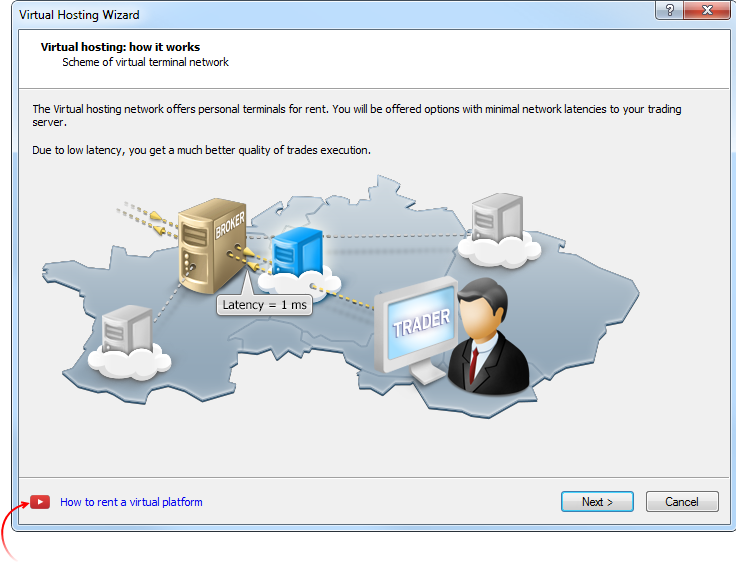
Terminal
- Fixed sorting of MQL4 programs in the sub-folders of the Navigator window. Applications are sorted by name.
- Fixed drawing of the network connection status indicator on ultra-high-definition screens (4K).
- Fixed display of the print preview window in the News section.
- A full-featured search function has been added to the log viewer of the terminal, Expert Advisors, Strategy Tester and Virtual Hosting. You can search forward and backward, search for whole words and toggle case sensitivity.
MetaEditor
-
Added a link to the tutorial video "How to assemble a trading robot" to the MQL4 Wizard. Watch the three-minute video and develop a trading robot without writing a single line of code.
This video as well as many others is available on the official MetaQuotes Software Corp. YouTube channel.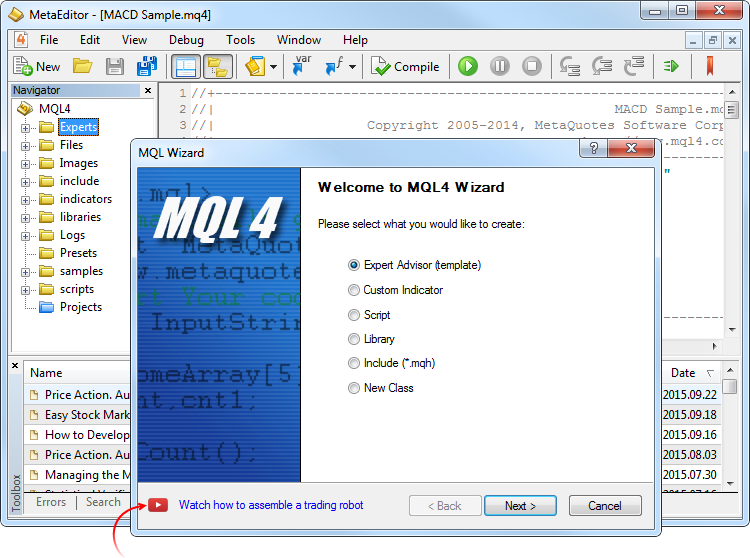
MQL4
- Fixed the value returned by the SignaBaseTotal function. In some cases, the function could return a zero value instead of the total number of signals available in the terminal.
- Fixed editing of graphical object visibility on different timeframes from MQL4 programs. In some cases, the object could be invisible on a chart after changing this property.
Tester
- Fixed display of price values and SL\TP levels in testing results.
Terminal
- The terminal interface has been completely adapted for
ultra-high-resolution (4K) displays. All user interface elements are properly
displayed on large screens. On smaller screens, the UI elements are
automatically enlarged for better readability.
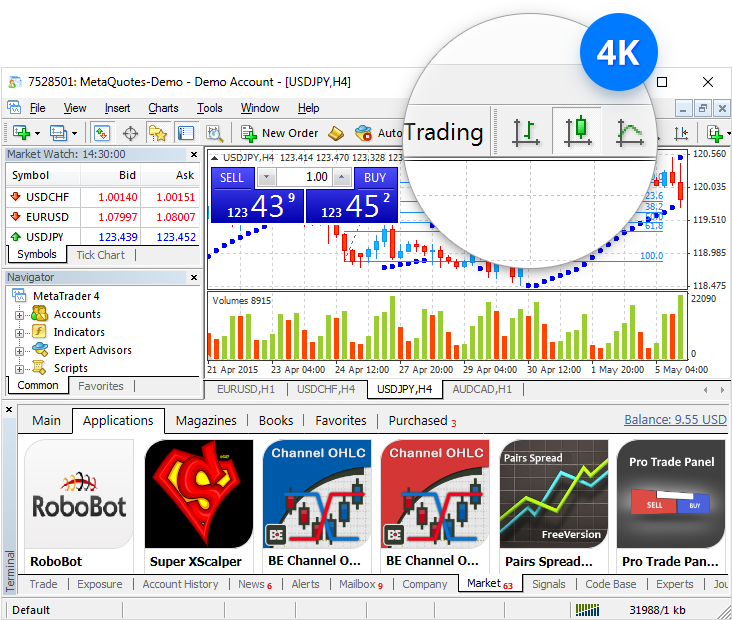
MQL4
- Fixed a bug that could occasionally cause "Error writing EX4" during compilation in Windows 10.
- Fixed a bug that could occasionally cause errors while loading external DLLs in scripts and Expert Advisors.
Virtual Hosting
- Fixed migration of trading environment with a custom indicator containing an EX4 library call, if the indicator is called from an Expert Advisor.
Signals
- Fixed error notifications on the signal subscription page. For example, notifications about the absence of required symbols for copying, about different trading conditions, etc.
MetaEditor
- Fixed arrangement of open windows, if one of them is maximized. Open files can be tiled, cascaded, arranged vertically and horizontally using appropriate commands of the Window menu.
Terminal
- Fixed initial and periodical scanning of trade servers
in the trading account opening dialog. Now, availability and pings are
defined in a timely manner with no need for manual scanning.
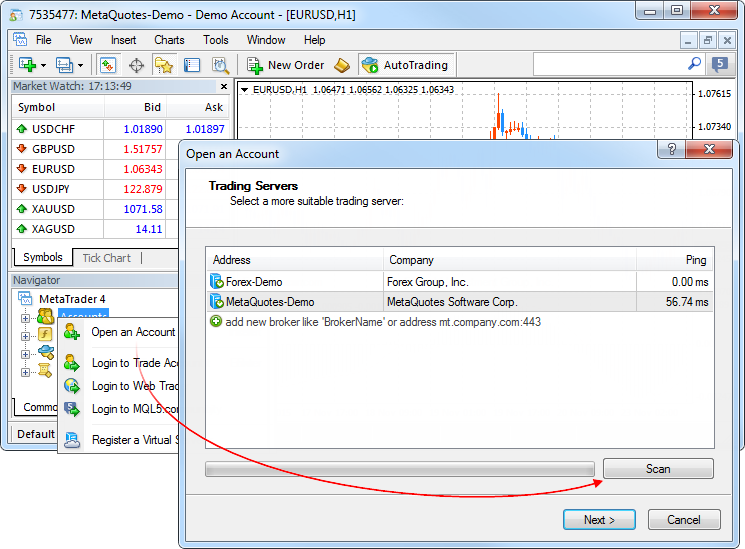
- Optimized and accelerated the client terminal operation.
- The terminal interface has been further adapted for high resolution screens (4K).
MQL4
- Fixed downloading custom indicators from MQL4 applications'
resources. Indicators are included into resources via the #resource
directive. This allows creating "all-in-one" applications that are much
easier to distribute.
- Fixed the accuracy of the level value display in custom indicators. Previously, the accuracy always comprised 4 decimal places, while now it depends on the accuracy of an appropriate custom indicator values.
- Fixed checking the possibility of reducing an object of one type to another type as a result of inheritance when passing the object as a method\function parameter.
- Fixed recalculation of standard indicators on a specified buffer (iIndicatorOnArray) in case the data is set by an array having a fixed size. Previously, the indicator was not recalculated occasionally.
- Fixed errors in class templates.
Tester
- Added ability to manage visualization mode when launching the tester from the configuration ini file. The new TestVisualEnable parameter (true/false) has been implemented for that. If the parameter is not specified, the current setting is used.
- Fixed an error in the CopyXXX functions that caused the real history data, instead of the test history one, to be returned.
- Fixed reading test parameters from the configuration ini file passed in the command line.
- Fixed excessive memory deallocation after closing a visual testing chart, which occasionally made history data unavailable for actually operating Expert Advisors.
Fixed errors reported in crash logs.
Code Base
- Fixed and accelerated downloading MQL4 programs from
the Code Base. Download free source codes of trading robots and
indicators directly in the platform.
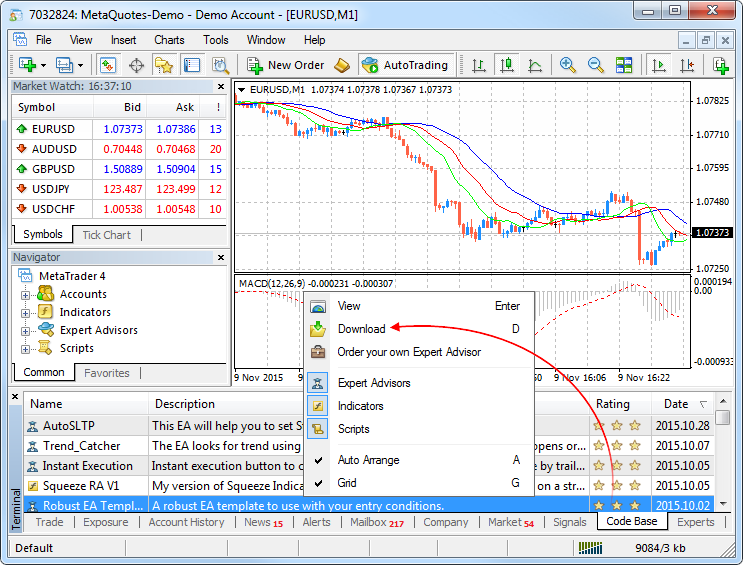
Terminal
- Fixed unloading price history from memory. An error occurred previously in case of insufficient memory.
- Fixed display of some user interface elements when working in Windows 10.
- Fixed removing graphical objects from the chart using the Backspace key.
Signals
- Improved and fixed translations of the trading signals showcase.
MQL4
- Added the SYMBOL_VISIBLE read-only property to the ENUM_SYMBOL_INFO_INTEGER enumeration.
- Fixed template operation.
- Fixed the ArrayCopy function behavior when copying a string array in case the data area of a data source and receiver overlap entirely or partially.
Tester
- Added a limitation when testing demo versions of indicators and Expert Advisors from MQL5 Market. Now, testing of paid products' demo versions is forcefully completed one week prior to the current terminal date.
MetaEditor
- Fixed occasional conflicts between tooltips and other applications.